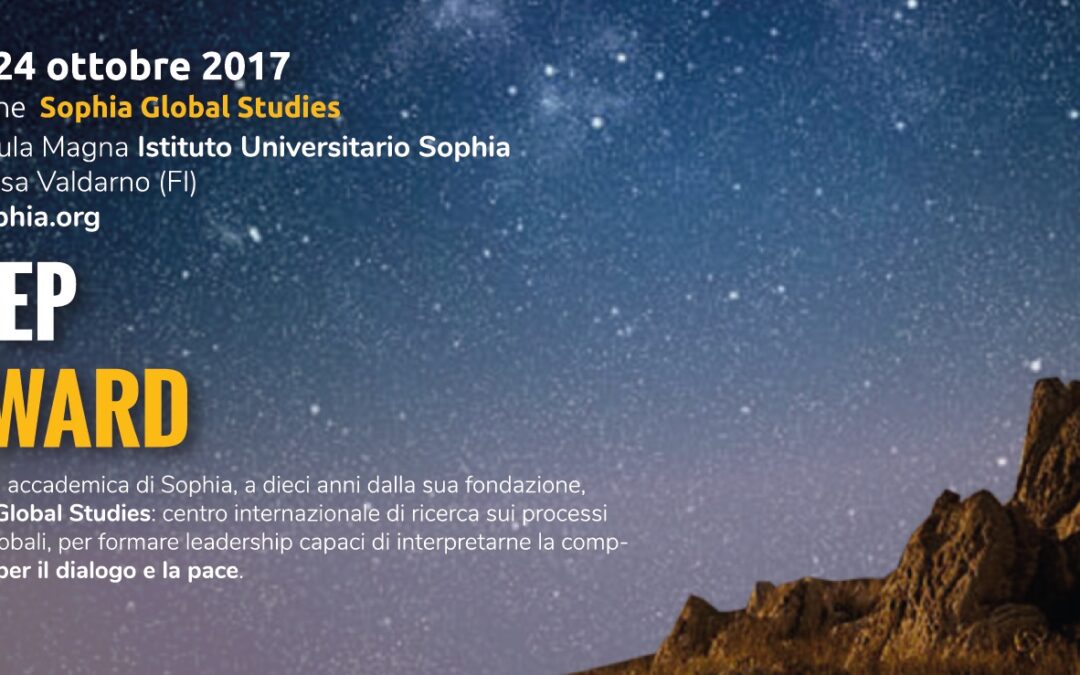
Oct 12, 2017 | Non categorizzato
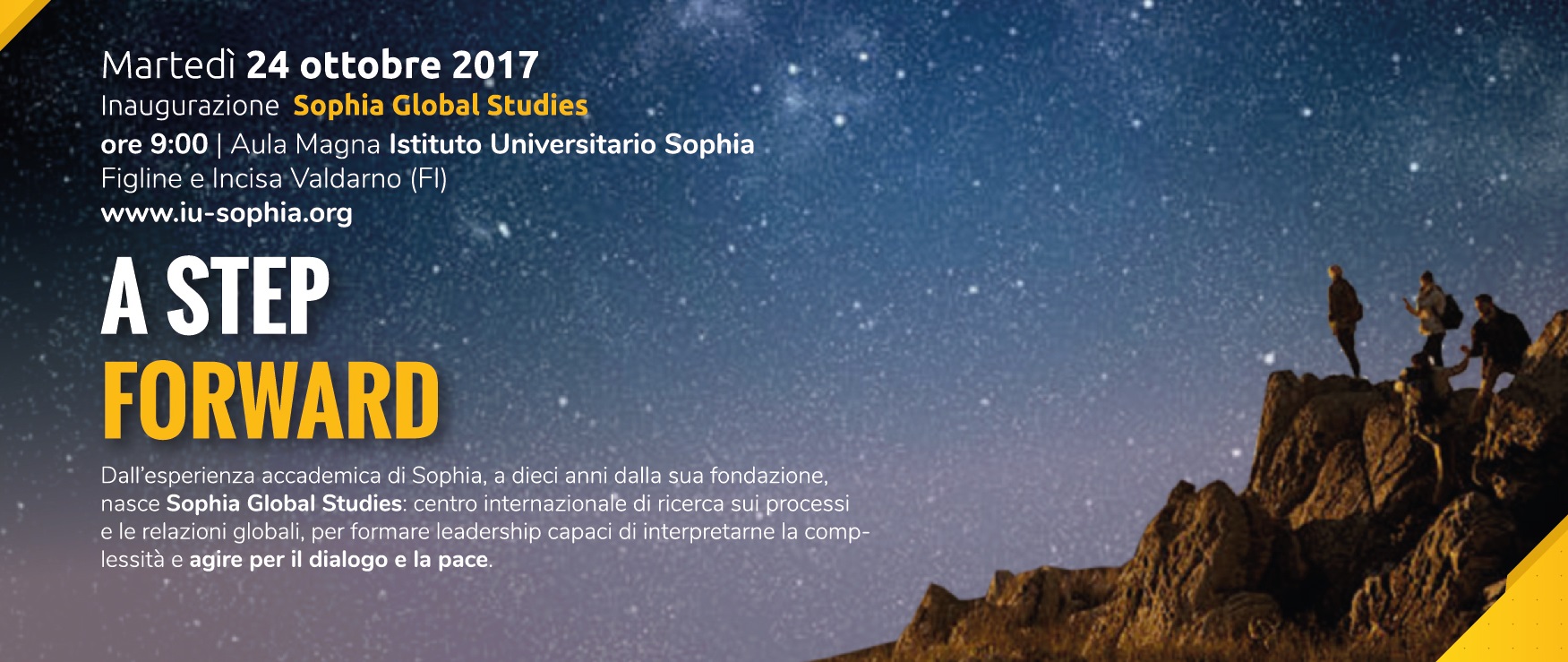 The tenth academic year of Sophia University Institute, which was formalized on December 7, 2007 by Pontifical Decree, will be launched on October 24, 2017. In the letter sent on that occasion to Chiara Lubich, who was the inspiration of Sophia, the Prefect of the Congregation for Catholic Education underscored the novelty of the Institute “that flows from the roots of the spirituality of unity and from the Movement’s rich experience.” He also asserted his best wishes for this “important project, well rooted in the academic tradition but also brave and forward-looking.” Ten year later, the Sophia academic community gratefully remembers the journey from then until now and plans strategies that will determine the near future in total faithfulness to the mission that has shaped Sophia Institute. The main event of the day will be the official opening of the new Sophia Global Studies Academic Centre. Inauguration Forum
The tenth academic year of Sophia University Institute, which was formalized on December 7, 2007 by Pontifical Decree, will be launched on October 24, 2017. In the letter sent on that occasion to Chiara Lubich, who was the inspiration of Sophia, the Prefect of the Congregation for Catholic Education underscored the novelty of the Institute “that flows from the roots of the spirituality of unity and from the Movement’s rich experience.” He also asserted his best wishes for this “important project, well rooted in the academic tradition but also brave and forward-looking.” Ten year later, the Sophia academic community gratefully remembers the journey from then until now and plans strategies that will determine the near future in total faithfulness to the mission that has shaped Sophia Institute. The main event of the day will be the official opening of the new Sophia Global Studies Academic Centre. Inauguration Forum
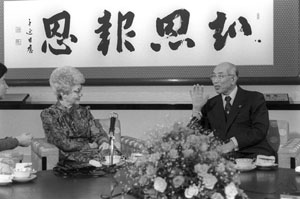
Oct 12, 2017 | Non categorizzato
 The crisis that has triggered around North Korea’s ballistic experiments and the reaction of the United States Administration have generated fears of the concrete possibility of a nuclear conflict. The old Latin adage to keep the peace prepare war is senseless today. The consequences of a conflict, furthermore with nuclear weapons, would have devastating consequences for the entire planet. Peace must be reached at all costs wherever it is strained and maintained, and wherever it has been achieved. The members of the Focolare Movement feel a growing awareness of the role each of us can play as individuals and as a community, in this process. Besides prayers, they have undertaken different types of common endeavours, often inspired by the initiatives of other organisations or movements with which the Focolare collaborates. In this sense we have to recall what the spiritual friendship between Chiara Lubich and Nikkyo Niwano, founder of the Japanese Buddhist movement, Rissho Kosei kai, has done to contribute to the cause of peace and to educate the new generations about this. “Despite the difficulties, our cooperation will make us hope that we can work for peace together,” Niwano wrote to Chiara. On the occasion of the Focolare’s 50th anniversary, the founder of the Buddhist movement and his son, Nichico, repeated this common commitment to “make our human family more united.” The Rissho Kosei kai also made itself heard over the last days with an official communication of the President-elect, Rev. Madame Kosho Niwano, to the world’s political and spiritual leaders, to renew the commitment of her movement and to ask them to leave no stone unturned in preserving peace in the Korean peninsula. The appeal draws inspiration from the ideas of the founder, Niwano, who on the occasion of his speech before the United Nations Assembly in 1978 right in the midst of the Cold War, had addressed the leaders of the USA and USSR. “Instead of risking with arms, please take the risk of peace and disarmament,” he said. Niwano, like many religious leaders of his time, among which were Paul VI, John Paul II, and Chiara Lubich, had realised the responsibility of religions in contributing to the creation and maintenance of world peace. The message Mme. Niwano also sent to Maria Voce, President of the Focolare Movement, is that of a daughter of a people that had suffered in an indescribable manner in the last world conflict that had set the political leaders of the world before the danger of the effects of sanctions that could cause unpredictable reactions. Also in the West there is a growing awareness of the danger of a nuclear escalation. On the occasion of the remembrance of the Day of Prayer for peace, established by John Paul II in 1986, the Committee for a Civilisation of Love prepared a meditation entitled Project for peace in the Korean region for the convention to be held at the convention in the Sacred Convent of Assisi (Italy) next 28 October. Read the original message
The crisis that has triggered around North Korea’s ballistic experiments and the reaction of the United States Administration have generated fears of the concrete possibility of a nuclear conflict. The old Latin adage to keep the peace prepare war is senseless today. The consequences of a conflict, furthermore with nuclear weapons, would have devastating consequences for the entire planet. Peace must be reached at all costs wherever it is strained and maintained, and wherever it has been achieved. The members of the Focolare Movement feel a growing awareness of the role each of us can play as individuals and as a community, in this process. Besides prayers, they have undertaken different types of common endeavours, often inspired by the initiatives of other organisations or movements with which the Focolare collaborates. In this sense we have to recall what the spiritual friendship between Chiara Lubich and Nikkyo Niwano, founder of the Japanese Buddhist movement, Rissho Kosei kai, has done to contribute to the cause of peace and to educate the new generations about this. “Despite the difficulties, our cooperation will make us hope that we can work for peace together,” Niwano wrote to Chiara. On the occasion of the Focolare’s 50th anniversary, the founder of the Buddhist movement and his son, Nichico, repeated this common commitment to “make our human family more united.” The Rissho Kosei kai also made itself heard over the last days with an official communication of the President-elect, Rev. Madame Kosho Niwano, to the world’s political and spiritual leaders, to renew the commitment of her movement and to ask them to leave no stone unturned in preserving peace in the Korean peninsula. The appeal draws inspiration from the ideas of the founder, Niwano, who on the occasion of his speech before the United Nations Assembly in 1978 right in the midst of the Cold War, had addressed the leaders of the USA and USSR. “Instead of risking with arms, please take the risk of peace and disarmament,” he said. Niwano, like many religious leaders of his time, among which were Paul VI, John Paul II, and Chiara Lubich, had realised the responsibility of religions in contributing to the creation and maintenance of world peace. The message Mme. Niwano also sent to Maria Voce, President of the Focolare Movement, is that of a daughter of a people that had suffered in an indescribable manner in the last world conflict that had set the political leaders of the world before the danger of the effects of sanctions that could cause unpredictable reactions. Also in the West there is a growing awareness of the danger of a nuclear escalation. On the occasion of the remembrance of the Day of Prayer for peace, established by John Paul II in 1986, the Committee for a Civilisation of Love prepared a meditation entitled Project for peace in the Korean region for the convention to be held at the convention in the Sacred Convent of Assisi (Italy) next 28 October. Read the original message
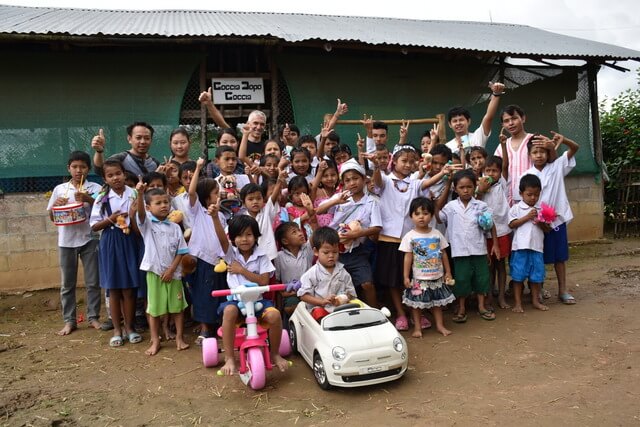
Oct 11, 2017 | Focolare Worldwide
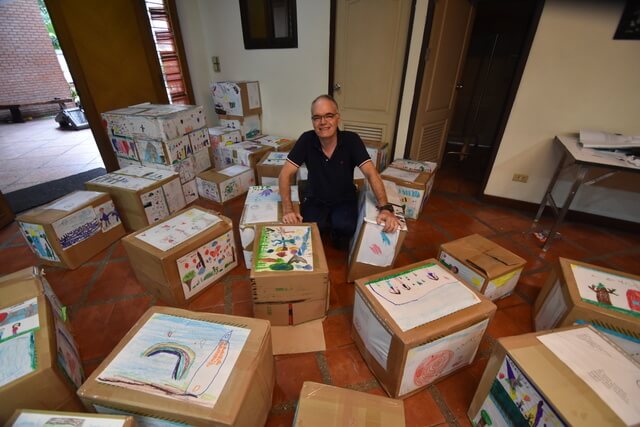 “We just got back from three days among the Karen refugees in Mae Sot, at the border with Myanmar. It was quite an experience, like any experience that brings you into direct contact with people’s pain.” Luigi Butori has lived in south east asia for many years, in one of the focolare or “hearth” communities of that region. “We loaded up the van, more than 30 crates that had arrived from Italy and took off with Glauco and Num, a Buddhist Gen. It’s now customary for us to make this 500 km journey every three or four months.” Mae Sot is a city of west Thailand close to the Myanmar border. It’s an important link with the nearby country, a place of refuge for many refugees and immigrants in general. They live in bad social and economic conditions. “These are our people,” Luigi writes. Those of them who have a job in the agricultural plants or in local industry are at times the victims of exploitation and paid starvation wages. But multitudes of refugees have found a refuge in the many camps that have been set up by international organisations that work in the border region, on Thailand territory. Many of the persecuted come from the Karen people. Their story is largely unkown. They’re simple farming folk who were forced to fun away. This is one of the many neglected conflicts which the media, however, considers to be of low intensity.
“We just got back from three days among the Karen refugees in Mae Sot, at the border with Myanmar. It was quite an experience, like any experience that brings you into direct contact with people’s pain.” Luigi Butori has lived in south east asia for many years, in one of the focolare or “hearth” communities of that region. “We loaded up the van, more than 30 crates that had arrived from Italy and took off with Glauco and Num, a Buddhist Gen. It’s now customary for us to make this 500 km journey every three or four months.” Mae Sot is a city of west Thailand close to the Myanmar border. It’s an important link with the nearby country, a place of refuge for many refugees and immigrants in general. They live in bad social and economic conditions. “These are our people,” Luigi writes. Those of them who have a job in the agricultural plants or in local industry are at times the victims of exploitation and paid starvation wages. But multitudes of refugees have found a refuge in the many camps that have been set up by international organisations that work in the border region, on Thailand territory. Many of the persecuted come from the Karen people. Their story is largely unkown. They’re simple farming folk who were forced to fun away. This is one of the many neglected conflicts which the media, however, considers to be of low intensity. 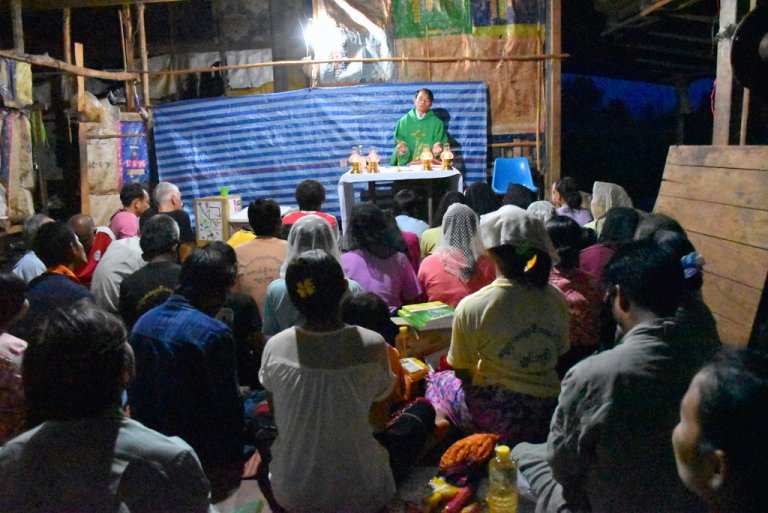 We had planned this trip a long time ago with Father Joachim, a Burmese priest who lives in Mae-Sot. Jim, another focolarino from Bangkok, met us in the morning, after a ten-hour overnight bus ride with a lot of checkpoints along the way. Every time you arrive in Mae Sot, it feels like you’re entering another world where values are changed. In the place of consumerism and comfort, we meet people without anything, yet they’re happy with the little they receive from us, and which we’ve recevied from many others from far and near. They know that we’re only there out of love for them: “This love that you bring to us is the reason why we carry on living and hoping,” they said to us more than once. We ate togetherw with them, which was a witness that spoke on its own. One evening we went into the midst of the camps and it was like walking into the middle of nothingness, with our van sinking into the mud and surrounded by the corn fields. It was all because we had to pick up a Catholic family and go to another location where forty Catholics were awaiting us for Mass. It was dark, rainy, and the place was full of mosquitos. We stood beneath a canopy in a large barn with a little bit of light. I suddenly started to think about the beautiful cathedrals in Rome where I lived five years ago. I thought about the paintings, the organs and the beautiful lights. That barn filled with mosquitos, with that gentle light and with all those people seated on the ground, seemed like a basilica to me. Because Jesus was there, spiritually, with us, in the midst of that crowd that didn’t have anything.”
We had planned this trip a long time ago with Father Joachim, a Burmese priest who lives in Mae-Sot. Jim, another focolarino from Bangkok, met us in the morning, after a ten-hour overnight bus ride with a lot of checkpoints along the way. Every time you arrive in Mae Sot, it feels like you’re entering another world where values are changed. In the place of consumerism and comfort, we meet people without anything, yet they’re happy with the little they receive from us, and which we’ve recevied from many others from far and near. They know that we’re only there out of love for them: “This love that you bring to us is the reason why we carry on living and hoping,” they said to us more than once. We ate togetherw with them, which was a witness that spoke on its own. One evening we went into the midst of the camps and it was like walking into the middle of nothingness, with our van sinking into the mud and surrounded by the corn fields. It was all because we had to pick up a Catholic family and go to another location where forty Catholics were awaiting us for Mass. It was dark, rainy, and the place was full of mosquitos. We stood beneath a canopy in a large barn with a little bit of light. I suddenly started to think about the beautiful cathedrals in Rome where I lived five years ago. I thought about the paintings, the organs and the beautiful lights. That barn filled with mosquitos, with that gentle light and with all those people seated on the ground, seemed like a basilica to me. Because Jesus was there, spiritually, with us, in the midst of that crowd that didn’t have anything.”  For several years Luigi has been the link between a schools twinning project that links Karen children in Mae Sot with those of Latina and with a group in Lucca, Italy and Poshiavo, Switzerland. With the funds and the materials gathered, it has been possible to build and start up a small school called “Drop by Drop”. “All of us in Class Four have met Luigi,” write the students from the C. Goldoni Elementary School in Latina. “We were happy to see him again, but mostly curious to hear the news about our Karen friends and their school. He showed us photographs and shared information about what’s going on up there. We were surprised to see how things that we consider totally normal – like a bathroom, a wooden bridge – for them is still something that is totally missing in their daily lives. Thanks to the Drop by Drop project we can build bridges of solidarity with our friends far away.”
For several years Luigi has been the link between a schools twinning project that links Karen children in Mae Sot with those of Latina and with a group in Lucca, Italy and Poshiavo, Switzerland. With the funds and the materials gathered, it has been possible to build and start up a small school called “Drop by Drop”. “All of us in Class Four have met Luigi,” write the students from the C. Goldoni Elementary School in Latina. “We were happy to see him again, but mostly curious to hear the news about our Karen friends and their school. He showed us photographs and shared information about what’s going on up there. We were surprised to see how things that we consider totally normal – like a bathroom, a wooden bridge – for them is still something that is totally missing in their daily lives. Thanks to the Drop by Drop project we can build bridges of solidarity with our friends far away.”
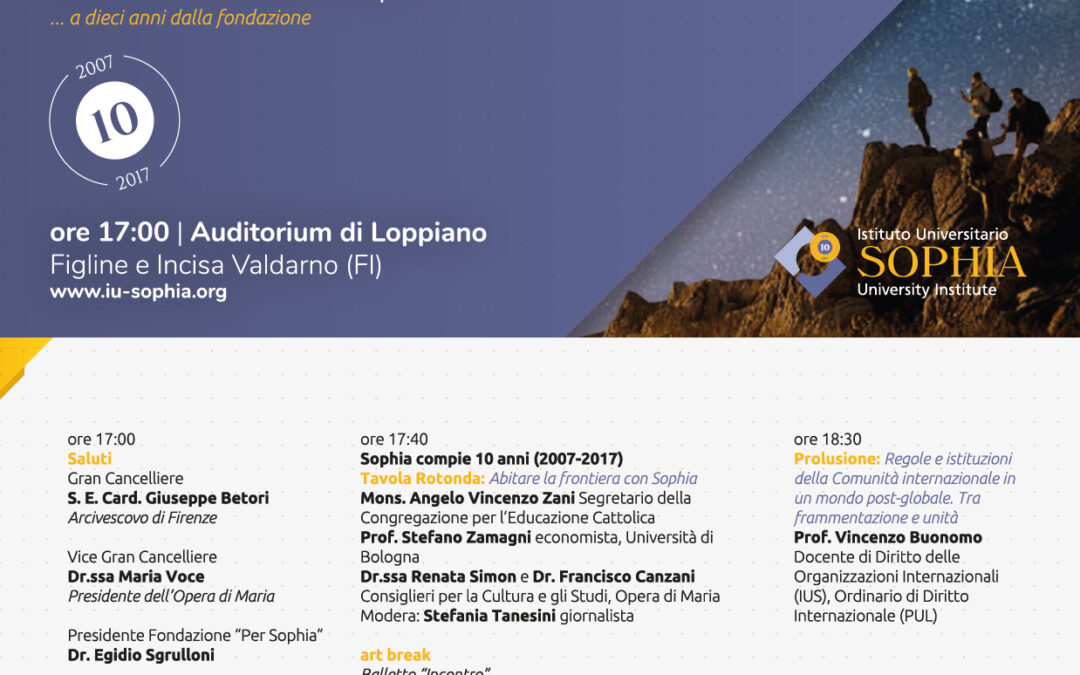
Oct 10, 2017 | Non categorizzato
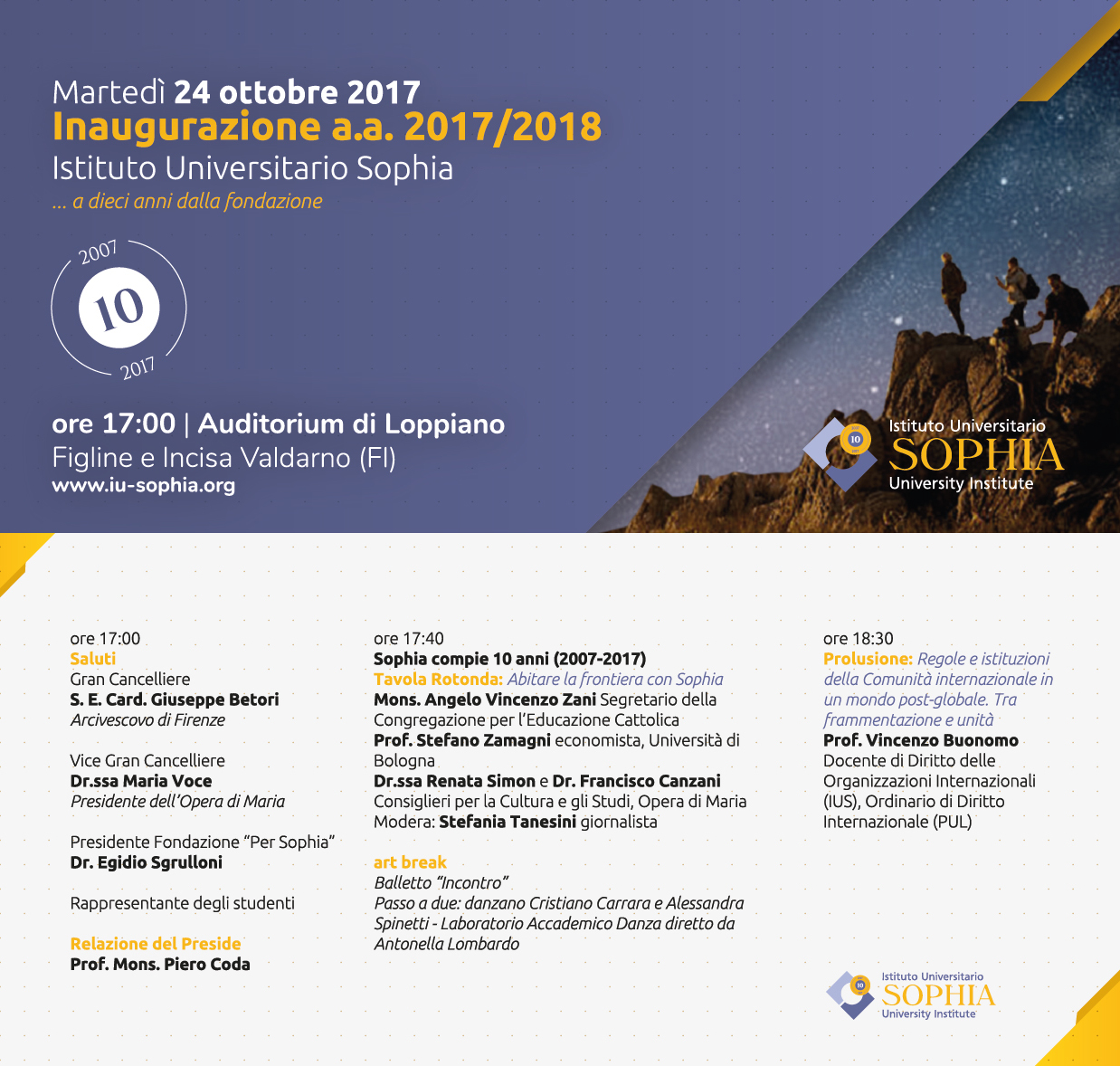 The event was divided in two parts. A forum in English will be held at 9:00 in the Great Hall of Sophia University Institute, titled Perspectives on Global Transformations. The will mark the official opening of the Sophia Global Studies Centre. At 17:00 the official inauguration of the Academic Year will be held in the Auditorium of Loppiano and include a moment of reflection on the new challenges facing Sophia. Program
The event was divided in two parts. A forum in English will be held at 9:00 in the Great Hall of Sophia University Institute, titled Perspectives on Global Transformations. The will mark the official opening of the Sophia Global Studies Centre. At 17:00 the official inauguration of the Academic Year will be held in the Auditorium of Loppiano and include a moment of reflection on the new challenges facing Sophia. Program
Oct 10, 2017 | Focolare Worldwide
In front of the situation that has been created in Catalonia, the Focolare Movement in Spain has launched a communiqué through which one commits to living a culture of dialogue, “a powerful tool that makes interests in others possible, entering into the reality they live, to know it, accept it and, inasmuch as possible, comprehend it. We consider plurality a positive challenge and enormous value.” Many initiatives are being promoted to solicit dialogue, especially with the political class. “We strongly support them, because we consider them to be signs of a mature democratic society that wagers on reconciliation.” The Focolare Movement in Spain simultaneously proposes a collection of signatures, in which the whole world can take part, with the goal of finding a path to peaceful coexistence in diversity, and the acknowldgement of the human dignity of every person and institution that represents them. It is a campaign of sensitization and commitment on the social network, under the hashtag #SoyDiálogo, which invites one and all to become active promotors of listening, respect, dialogue and peaceful actions.

 The tenth academic year of Sophia University Institute, which was formalized on December 7, 2007 by Pontifical Decree, will be launched on October 24, 2017. In the letter sent on that occasion to Chiara Lubich, who was the inspiration of Sophia, the Prefect of the Congregation for Catholic Education underscored the novelty of the Institute “that flows from the roots of the spirituality of unity and from the Movement’s rich experience.” He also asserted his best wishes for this “important project, well rooted in the academic tradition but also brave and forward-looking.” Ten year later, the Sophia academic community gratefully remembers the journey from then until now and plans strategies that will determine the near future in total faithfulness to the mission that has shaped Sophia Institute. The main event of the day will be the official opening of the new Sophia Global Studies Academic Centre. Inauguration Forum
The tenth academic year of Sophia University Institute, which was formalized on December 7, 2007 by Pontifical Decree, will be launched on October 24, 2017. In the letter sent on that occasion to Chiara Lubich, who was the inspiration of Sophia, the Prefect of the Congregation for Catholic Education underscored the novelty of the Institute “that flows from the roots of the spirituality of unity and from the Movement’s rich experience.” He also asserted his best wishes for this “important project, well rooted in the academic tradition but also brave and forward-looking.” Ten year later, the Sophia academic community gratefully remembers the journey from then until now and plans strategies that will determine the near future in total faithfulness to the mission that has shaped Sophia Institute. The main event of the day will be the official opening of the new Sophia Global Studies Academic Centre. Inauguration Forum 





